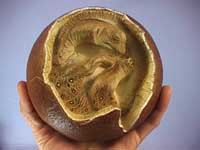Researchers Can't Admire to Their Hearts' Content by Newly Found Skulls of Sauropod
Sauropod, a new species of Plant-eater Dinosaur, nearly 105 million years old, has been found in Utah by a team of Paleontologists, which includes researchers from BYU and Dinosaur National Monument.

"It is amazing. You can hold the skull in your hands and look into the eyes of something that lived a very long time ago", says Paleontologist Brooks Britt of Brigham Young University, a member of the team publishing the Naturwissenschaften Journal study.
The team led by Daniel Chure found out that of the total four skulls, one skull was complete, two nearly-complete and the last appeared partial skull.
It is estimated that the sauropod dinosaurs were four-footed, long-necked and long-tailed dinosaurs that chewed low vegetation. They would have been about 25 feet long when they died, and would have doubled in size at adulthood.
"I can tell you that the new fossils are quite sensational. It's very rare for the skulls of sauropods to survive fossilization, because they are so lightly built", says Paleontologist Mike Taylor of University College London.
An ancient stream bed, parched by an ancient drought, appears to be the cause of the death of the dinosaurs who were buried in a flash flood soon after their demise.
TopNews United States has contributed to the report.
Subscribe to Pravda.Ru Telegram channel, Facebook, RSS!





